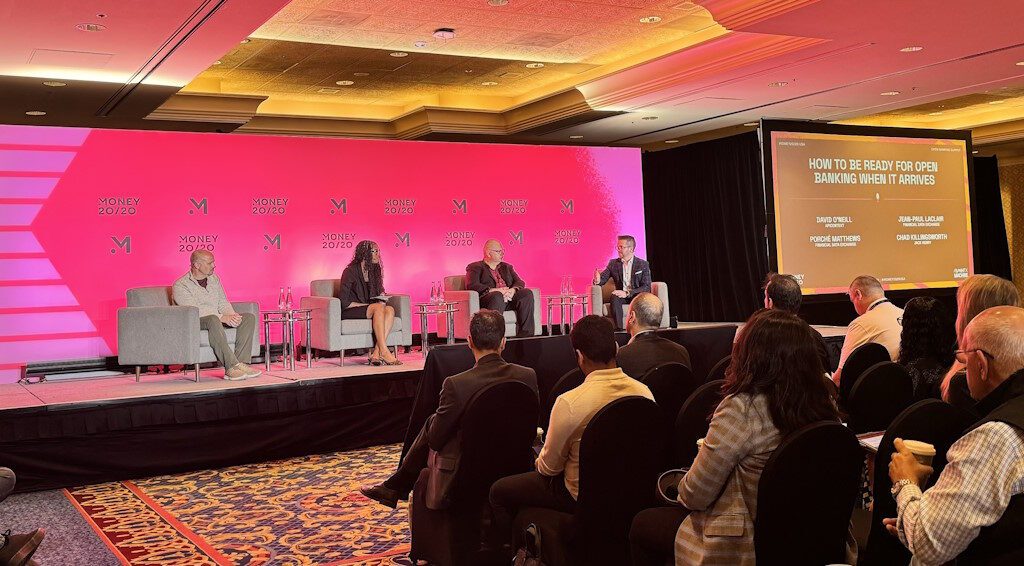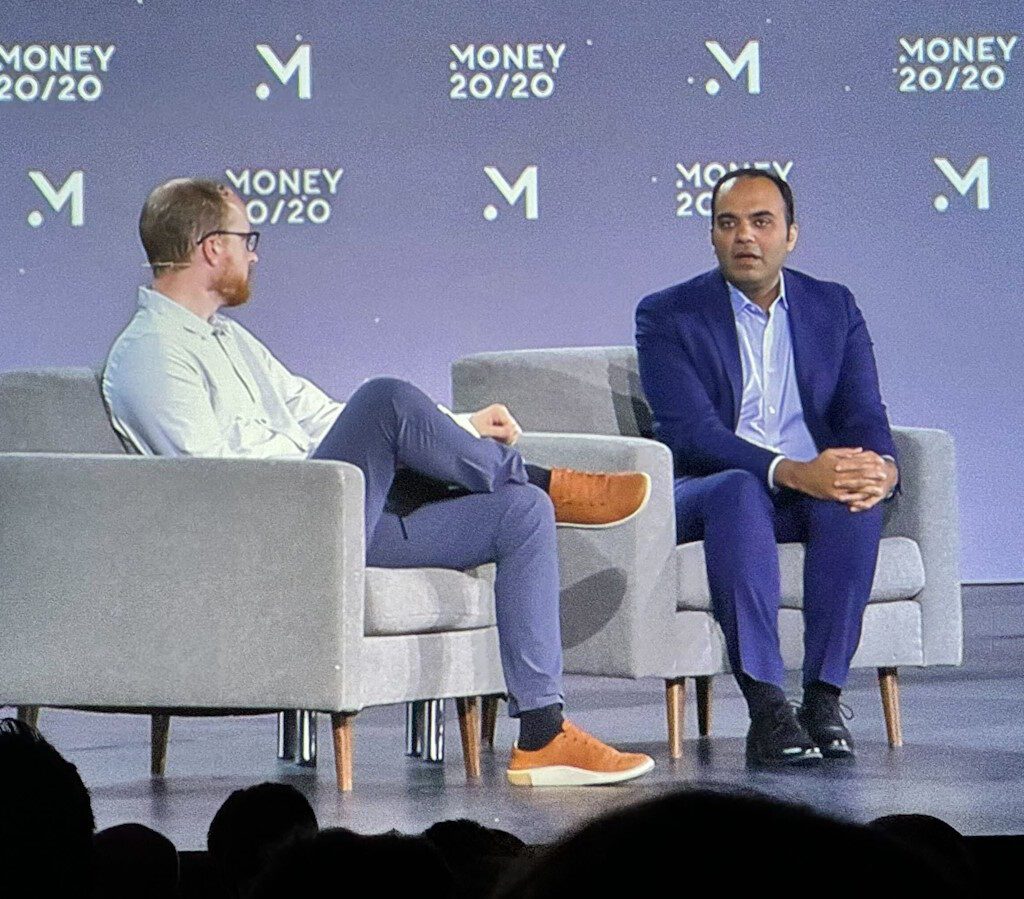Despite having worked in the Payments and Banking industry for over 20 years, this is my first time at Money 2020.
I just haven’t been a big conference guy. It’s the relationships I develop directly through my work that I’ve valued more over my career. Plus, the modest introvert within me recoils at the phrase “networking happy hour.”
But Money 2020 is the conference to go to for people in my business. Sure, there are others like ETA and AFP and other acronyms the majority of you will never have to learn, but Money 2020 is the one conference to rule them all.

This is also my first time in Vegas in quite a while. (A couple of young kids will do that to you.) My goodness a lot has changed. After stepping into my hotel room at the Venetian I was greeted with a view of Jupiter and its moons rotating on The Sphere outside my window. That’s different.
But I’m here now, and I’m excited to share what I see and what I learn over the next three days. I hope you come along for the ride.
Preparing for the Conference
As any Money 2020 veteran will tell you, preparation is key to a successful conference. That’s the advice I got, and I took it to heart.
The conference does make it easier for you to meet folks (again, which my INTJ-self appreciates).
The app/website offers a Tinder style platform where you can see and search all attendees and express “Interest” in meeting them while at the conference. And yes, if they express interest back, congrats: it’s a “match!” The site also enables meeting requests and even offers table numbers in the Connections Lounge where you can meet for those arranged setups.
Not bad. And I took advantage, with over 15 individual meetings lined up before I even stepped into the faux St. Mark’s Square here.
Pro-tip, book those breakfast and dinner reservations months in advance, because everything is reserved, and only so many people can crowd into a Starbucks.
Oh, and the last, best tip ever: wear comfortable shoes. Everyone else is.
Okay, on to the show!
Today’s Big Takeaway: Everyone is Talking About Open Banking
I think the CFPB has a good PR team.
Just last week they announced the final rules around “Section 1033” of the Dodd-Frank act that gives consumers the right to access financial information that their banks or other financial institutions hold about them, along with all the rules surrounding how that data sharing can take place. Here’s more of a primer on that if you’re interested, but it’s a pretty big deal in banking and Fintech circles.
Immediately after the CFPB’s announcement I imagine a good number of Money 2020 speakers were frantically updating their slides and speakers notes.
Anyway, now that the rules are out, how are banks going to respond? That’s the question on the minds of a lot of folks here today.

Here were some of the key themes from the various Open Banking sessions at Money 2020:
Your standards aren’t good enough
Before, big banks were able to publish their own standards for how other institutions can connect to bank systems via APIs. That changes with 1033. It specifies that there will be standards-setting bodies and rules around data transactions, security, and more. FDX is a player to know in this space, offering a set of (voluntary) standards and tools to support.
Screen scrapers are dead
In the early days of finance data aggregators, some services like Plaid and Mint employed “screen scraping,” which is using your credentials (that you gave permission to use) to mimic a login and retrieval of information. While the technology – and collaboration – has improved over the years, 1033 is the nail in the coffin for screen scrapers, who initially had little to no relationship with the financial institutions from which they’re retrieving data.
With the new rules, you as a consumer will now have a place to see who you’ve given permission to see your financial data. This brings greater transparency and control to consumers, which I personally welcome.
Smaller banks have work to do, too
The 1033 regulation only applies to institutions over $850M in assets. However, several speakers pointed out that if consumers start having an expectation of control over who can access their financial data, then even smaller regional and community banks will have incentive to not be left behind. The market will motivate.
And it’s going to be really hard for them. A rep from the National Banker’s Association casually let it slip that “They don’t even know what data they have,” referring to these smaller banks. Just extracting their own data can be a challenge today, so this is an opportunity – if not a push – toward greater maturity in data management.
There is an offensive play here
Regulations by nature require a defensive response. But ignoring the opportunity of an “offensive” play would be a mistake.
A clear opportunity here is to create an outstanding customer experience that offers control over how data is shared, along with rich history of when data was shared, enabling a consumer-friendly level of transparency that doesn’t exist today. Mastercard is already on the ball.
One speaker also offered that the capabilities built for Open Banking can also be used for other products and services the bank is currently providing – capabilities such as budgeting tools, personalized finance advice, and integrated business tools. In other words, think beyond just the compliance issue.
Open Banking is a gateway to Open Finance
Imagine you are a small business looking to secure working capital on short notice to help alleviate cash flow cycles. The access that Open Banking enables means that you can give permission for potential lenders to look at your company’s finances directly instead of you having to generate PDF statements and email them to an underwriter. The decision process is quicker, and the overall experience is better – for all parties. This can also be seen as another opportunity for banks to go on offense.
Don’t wait
There is a lot of work to do by all banks. Even though the deadlines were extended with the final rules, speakers spoke with urgency, saying banks need to start now on their compliance journey. Sure, the biggest institutions – the ones that have to be compliant in the next year or so – are pretty much ready. But for that next tier, they can’t think of Open Banking compliance as a “tomorrow problem.”
Additionally, a common refrain is “this is not my problem; this is my core banking provider’s problem.” And it’s true that Fiserv, FIS, Jack Henry, and other banking platform providers are tackling 1033 compliance with their technology. But leaving the problem solving to them alone would be unwise.
Oh, and early compliance and proactive engagement with these new standards may actually become a competitive advantage.

Concluding a packed Day One agenda was none other than the Director of the CFPB, Rohit Chopra, who was interviewed by industry veteran and friend-of-Further, Alex Johnson. He was impressive, competently fielding informed questions about his agency’s rationale for certain changes in the rules and what they hoped to accomplish. In short: competition benefits the consumer.
Connections, Connections, Connections
As I mentioned in the introduction, a goal of any Money 2020 attendee should be to meet with other people in the industry. After all, the consulting business is one based nearly entirely on relationships.
Suffice it to say, I truly enjoyed all the conversations I had with folks today. I won’t share details of those individual moments here, but for those I met, the pleasure was mine. Thank you.
Okay, that’s a wrap for Day One. At it again tomorrow!
Banks have never seen more disruption, from unprecedented market and regulatory challenges to intense competition from fintech challengers. Further Advisory works with major financial services firms to establish transformational strategies, build new digital capabilities, and accelerate launches, all while modernizing core business operations.




